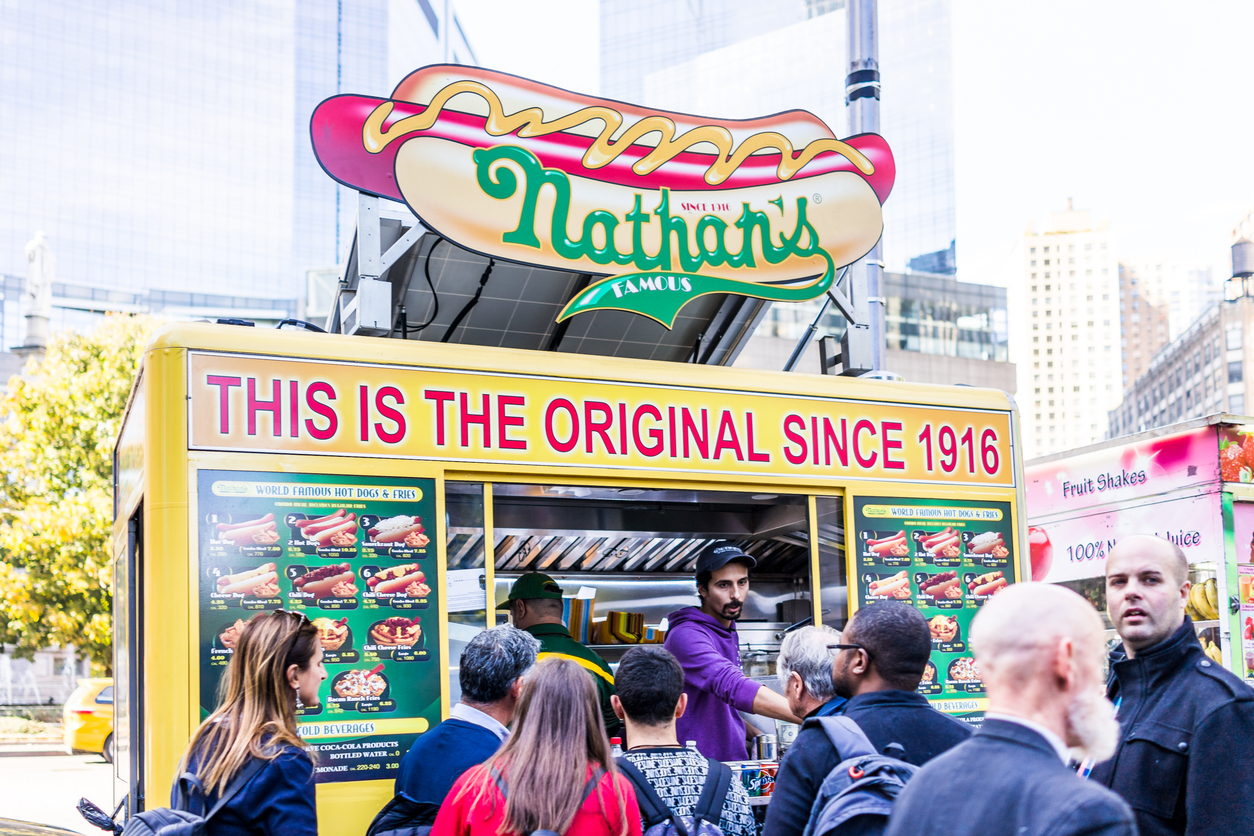
The Fourth of July is less than a month away, and that often means fireworks and barbecues with burgers and hot dogs in large quantities. But one Independence Day staple won’t be present at the Nathan’s Famous Fourth of July Internal Hot Dog Eating Contest in Brooklyn this year — competitive eating champion Joey Chestnut. According to CBS News, Chestnut claims he was banned from the contest after signing a deal with Impossible Foods, which makes plant-based hot dogs. Nathan’s and Major League Eating, who host the contest, claim the issue is over a perceived exclusivity deal around hot dogs. “MLE and Nathan’s went to great lengths in recent months to accommodate Joey and his management team, agreeing to the appearance fee and allowing Joey to compete in a rival unbranded hot dog eating contest on Labor Day,” MLE said in a statement to CBS News.
Why it matters: As silly as a dust-up about hot dogs might seem, there are some real lessons to be learned here. First, Chesnut is an ambassador for Nathan’s and competitive eating — for many, he’s the first name many people think of when they think about eating contests. Keeping your influencers happy matters to external brand perception. But on the flip side, protecting your brand matters too. Major League Eating’s statement is forceful and while the subject matter might not seem too serious, it’s still big business. It outlines the exact reasoning for the decision. A little something to think about next time you reach for the relish to put on your hot dog.
Editor’s Top Reads:
- As we make our way through June, it’s not uncommon to see organizations making announcements regarding Pride Month or the upcoming commemoration of Juneteenth. But if some corporate shareholders get their way, there could be less of that in the future at some brands. According to a report by The Wall Street Journal, some shareholders at companies like GE Aerospace and UPS are voting against proposals tied to social justice and environmental issues, amid activist efforts to force votes. “We who would prefer corporate behavior without partisan influence have really started to get into the game after years of quiescence,” said Scott Shepard, general counsel at the National Center for Public Policy Research, or NCPPR, a conservative think tank that has proposed dozens of shareholder measures questioning corporate initiatives on climate, diversity and other subjects. However, while these groups claim to seek no partisan influence, they’re just on the opposite end of the political spectrum. It’s also notable that these sorts of pushback efforts have largely failed. But still, a company’s shareholders hold much sway, underscoring the importance of proper shareholder relations strategies. The Disney proxy battle earlier this year is a great example – Disney stood up for its best interests in the face of pressure. By putting on a major PR campaign in the face of the potential shareholder rebellion, Disney managed to win the proxy battle in both the public eye and the boardroom.
- When you think about bananas, you might not immediately think about how the fruit industry funds designated terrorist groups. But Chiquita recently found itself on the losing end of a civil case over financing the Colombian paramilitary group Autodefensas Unidas de Colombia. According to CNN, the company has been ordered to pay over $38 million to the families of eight victims killed by the AUC. CNN also reported the jury in the case found that “Chiquita knowingly provided substantial assistance to the AUC to a degree sufficient to create a foreseeable risk of harm to others.” In a statement after the ruling, the banana giant said: “The situation in Colombia was tragic for so many, including those directly affected by the violence there, and our thoughts remain with them and their families. However, that does not change our belief that there is no legal basis for these claims. While we are disappointed by the decision, we remain confident that our legal position will ultimately prevail.” This ruling underscores the importance of crisis communications. When a major ruling or negative piece of press rolls out, it’s critical to be ready to respond to defend the brand and confront the issue. While Chiquita denied wrongdoing in the case, it didn’t stay silent, which would have made things in an already bad situation much worse.
- Influencer and boxer Jake Paul is entering a new arena — skin care. According to CNBC, Paul is launching W, a skincare line aimed at men, at Walmart stores. “We saw this old and outdated category where the competitors have been on the shelves in the exact same way for the past 20 years,” Paul told CNBC. “We just believed we had a better vision, better product and could disrupt this entire space.” What’s most notable here is the timing of the release, just before Paul’s upcoming boxing bout with Mike Tyson. He’s taking advantage of the fevered pitch of media attention to tout his product — a move that will surely pay dividends long after the fight is forgotten.
Sean Devlin is an editor at Ragan Communications. In his spare time he enjoys Philly sports and hosting trivia.
COMMENT

